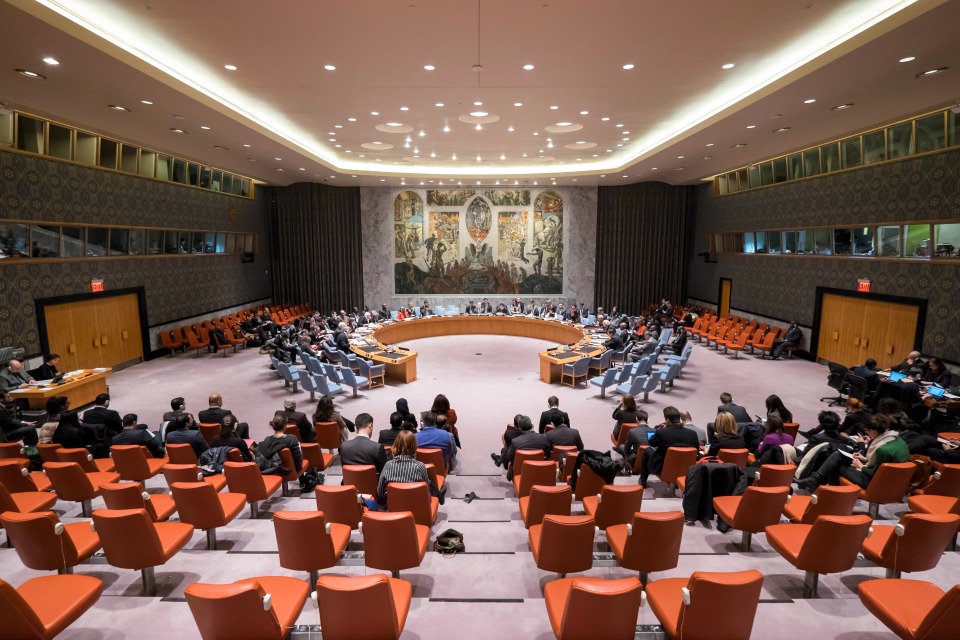Latest UN report shows growing levels of human rights violations in Ukraine
Statement by Ambassador Mark Lyall Grant of the UK Mission to the UN, at the Security Council Ukraine Humanitarian and Human Rights Briefing

Thank you Mr President, and thank you also to Under-Secretary-General Feltman and Assistant-Secretary-General Simonovic and Director Ging for your timely briefings today. We share your grave concern at the situation in Eastern Ukraine. This week the UN Human Rights Office reported that over 6,000 people have been killed since April 2014. In that time, over 15,000 people have been wounded and over 1.5 million have fled their homes. It should trouble us all that these grim milestones have been met in less than one year, and in spite of successive ceasefires.
Mr President, Behind these statistics lies a worrying and escalating humanitarian crisis which has further undermined the human rights of all those living in Eastern Ukraine. I can understand why the representative of Russia does not want to discuss the human rights situation in Ukraine. Because the latest report by the UN Human Rights Mission in Ukraine details a growing level of violations and abuse, including reports of arbitrary arrests, summary executions, torture and enforced disappearances. The report details indiscriminate shelling of populated areas, including deliberate attacks by Russian backed separatists on civilians being evacuated through Ukrainian controlled routes. And it highlights the humanitarian cost of the fighting; overburdened centres for IDPs, collapsing social services and a growing scarcity of food, water and heating. The violence is having a disproportionate effect on the most vulnerable, with women, children and the elderly increasingly caught up in the fighting. Thousands remain trapped in volatile locations like Debaltseve. Hospitals, schools and kindergartens have been deliberately shelled. And disturbing reports of sexual violence are on the rise. We call on both sides to respect international law to ensure the safety and security of all in the region, and to take active steps to ensure accountability for any violations and abuses of human rights. Sadly, investigations have been hindered by the separatists’ refusal to grant access to the territory they control. And we urge Russia to use its influence to overcome this.
Mr President, More must also be done – as agreed in Minsk on 12 February – to ensure the exchange of all hostages and unlawfully detained persons who remain in captivity. This includes Ukrainian pilot Nadia Savchenko held in solitary confinement who has been on extended hunger strike. Recent reports indicate that she has had to suspend her hunger strike after 83 days without food amid serious concerns for her health. As part of the agreement, Russia committed to releasing all prisoners – and yet Ms Savchenko and many others remain in captivity. This is a clear violation of the Minsk agreement. I would like to ask the Russian representative here today to explain to the Council why Ms Savchenko is still being held. And I would also like to remind the Russian Federation that while Ms Savchenko remains in their custody, they are fully responsible for her health and well-being.
Mr President, One year on from the illegal annexation of Crimea, we must be clear in our condemnation today of what the UN describes as “systematic human rights violations affecting mostly Crimean Tatars and those who opposed the March ‘referendum’”. The report details arrests, arbitrary detention and deportation of Crimean Tatar activists, denying them their freedom of religion and belief, their right to free expression, and their right to peaceful assembly. The continued denial of access to the OSCE Office for Democratic Institutions and Human Rights and the OSCE High Commissioner on National Minorities to Crimea is of particular concern.
Mr President, We must send a united message today on the issue of access. The Minsk agreement calls for the safe delivery of humanitarian aid to those in need. It calls for the OSCE to observe the withdrawal of heavy weapons, the border and the ceasefire. None of this can be achieved unless the Russian backed separatists grant free and unfettered access to the territory they control. We welcome Ukrainian President Poroshenko’s statement this week that the OSCE will be granted access by the separatists to ten locations in the east. I look forward to Russia’s confirmation that they will support this commitment, and that they will use all their influence to improve access for humanitarian deliveries.
Mr President, Russian so-called humanitarian convoys are of grave concern. Some are clearly being used as cover for the delivery of military supplies. Russian military hardware remains in Eastern Ukraine, despite the agreement at Minsk to withdraw foreign military formations. The UN Human Rights Mission in Ukraine details credible reports of “a continuing influx of heavy and sophisticated weaponry to armed groups in the Donetsk and Lunhansk regions, as well as foreign fighters, including from the Russian Federation”. The OSCE reported on Wednesday that an 83 vehicle convoy crossed the border from Russia at Donetsk. The Ukrainian government has made clear that it has not authorised such convoys. They are therefore a clear violation of Ukraine’s sovereignty and territorial integrity, and of international law. Should Russia wish to support the humanitarian effort, I urge them to donate money to the UN aid programme. Unless Russia changes its approach, we will have no choice but to maintain sanctions and continue our condemnation of Russia’s flagrant disregard for the territorial integrity and sovereignty of Ukraine; and the human rights of its people.
Thank you Mr President.